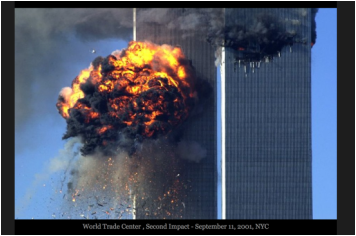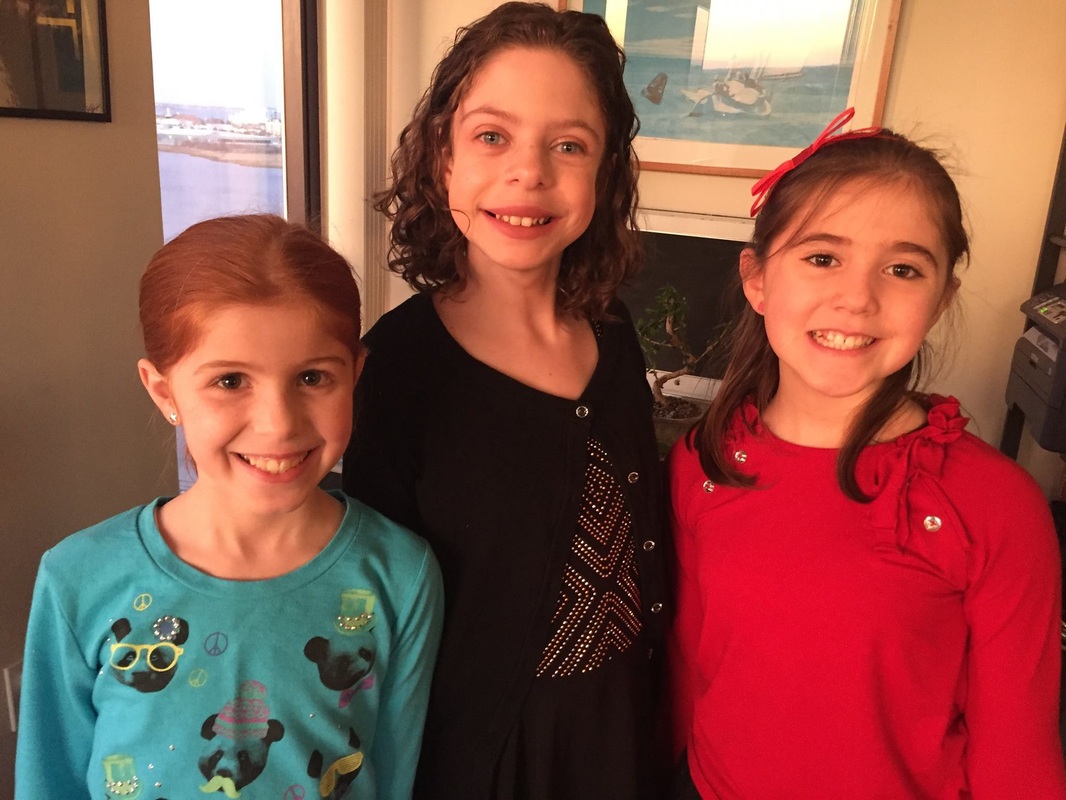 Second impact (c) José Antonio Rosario
Second impact (c) José Antonio Rosario TRIGGER WARNING: The content may be upsetting for some people.
The more I work with playwright Jim Dalglish on his play, Unsafe, the more my eyes are opened to repercussions 9/11 has made to our lives and how the attack can stand as a metaphor for shattered lives and ways we pick up the pieces.
The effects, large and small, are everywhere. There is now a memorial to 9/11 tucked off in a corner in the Public Gardens here in Boston. It’s a small reminder, but there it is, tugging you back to reality as you stroll through the Gardens without a care on those gorgeous days when the Hancock Tower rises up and mirrors the blue sky over the city, in the manner that the World Trade Center towered over Manhattan. The shaded, unpretentious spot hijacks your thoughts and whispers, Imagine an airliner crashing into the Hancock or the Pru, right now. What would you do? That’s crazy: It’s a beautiful day; the danger isn’t real: It’s all in your mind. And then, for this Bostonian, at least, it’s a simple leap to remembering the Marathon bombing. No, danger is everywhere—in the sky, in a backpack. Don’t relax. Stay alert.
We now have police routinely wearing full body armor, and ignoring the subliminal message, what overt message does that convey? What do I fear more?—the police, or the unseen danger I’m being protected from? And what exactly am I being protected from? I remember a world that was safe. Has it really changed?—because I still don’t see it except on the news, and that’s not really my reality. But for some, it is their reality. The world is unsafe.
There are those who have never known anything else except that they are required to take off their belts and shoes and watches, empty their pockets of cell phones and loose change, and sometimes submit to a full-body pat-down as they go through airport security. That all came out of the Aviation Transportation and Security Act, a response to 9/11. On recent trips to California and Puerto Rico when I was bestowed pre-approved status through security, the experience was exhilarating, like suddenly noticing you can easily breathe after a week-long bout of the flu. It was a throwback to the way air travel used to be before 9/11.
I met José Antonio Rosario in San Juan through our hostess. He is a lively, gregarious individual with eyes the same deep chocolate as were my father’s that look right into yours. He loves everything about life in San Juan—food, culture, architecture, art, people—and he is quick and eager to share it. So how on a intensely sunny street corner in picturesque Old San Juan did he suddenly start talking about his experiences from 9/11 that unfolded right outside his bedroom window? After thousands of dollars of medical expenses, the doctors couldn’t find out why his heart would beat so fast as he lay in bed at night. He moved to San Juan where he now lives, thousands of miles from New York City.
On that September morning, Rosario, a freelance photographer in New York City, had an assignment scheduled later that day, so when his wife, a filmmaker who was already out working, called, he was enjoying that special decadence that people who share tiny apartments crave: He was lounging in bed, alone, having postponed getting up to enjoy his solitude. She told him a plane had crashed into the north tower of the World Trade Center. He only had to roll over to see out his bedroom window, that’s how close he lived to the towers. And in that moment, like so many others, the life he was living changed forever.
The following video is rare dramatic footage of Rosario’s and filmmaker Catalina Santamaria's experience during the attacks and the days after. The video footage is Santamaria’s, and the stills were all taken by Rosario. It is narrated in Spanish, their native language, but you don’t have to speak Spanish to understand; we all know what happened, and the tone and message are clear.
The more I work with playwright Jim Dalglish on his play, Unsafe, the more my eyes are opened to repercussions 9/11 has made to our lives and how the attack can stand as a metaphor for shattered lives and ways we pick up the pieces.
The effects, large and small, are everywhere. There is now a memorial to 9/11 tucked off in a corner in the Public Gardens here in Boston. It’s a small reminder, but there it is, tugging you back to reality as you stroll through the Gardens without a care on those gorgeous days when the Hancock Tower rises up and mirrors the blue sky over the city, in the manner that the World Trade Center towered over Manhattan. The shaded, unpretentious spot hijacks your thoughts and whispers, Imagine an airliner crashing into the Hancock or the Pru, right now. What would you do? That’s crazy: It’s a beautiful day; the danger isn’t real: It’s all in your mind. And then, for this Bostonian, at least, it’s a simple leap to remembering the Marathon bombing. No, danger is everywhere—in the sky, in a backpack. Don’t relax. Stay alert.
We now have police routinely wearing full body armor, and ignoring the subliminal message, what overt message does that convey? What do I fear more?—the police, or the unseen danger I’m being protected from? And what exactly am I being protected from? I remember a world that was safe. Has it really changed?—because I still don’t see it except on the news, and that’s not really my reality. But for some, it is their reality. The world is unsafe.
There are those who have never known anything else except that they are required to take off their belts and shoes and watches, empty their pockets of cell phones and loose change, and sometimes submit to a full-body pat-down as they go through airport security. That all came out of the Aviation Transportation and Security Act, a response to 9/11. On recent trips to California and Puerto Rico when I was bestowed pre-approved status through security, the experience was exhilarating, like suddenly noticing you can easily breathe after a week-long bout of the flu. It was a throwback to the way air travel used to be before 9/11.
I met José Antonio Rosario in San Juan through our hostess. He is a lively, gregarious individual with eyes the same deep chocolate as were my father’s that look right into yours. He loves everything about life in San Juan—food, culture, architecture, art, people—and he is quick and eager to share it. So how on a intensely sunny street corner in picturesque Old San Juan did he suddenly start talking about his experiences from 9/11 that unfolded right outside his bedroom window? After thousands of dollars of medical expenses, the doctors couldn’t find out why his heart would beat so fast as he lay in bed at night. He moved to San Juan where he now lives, thousands of miles from New York City.
On that September morning, Rosario, a freelance photographer in New York City, had an assignment scheduled later that day, so when his wife, a filmmaker who was already out working, called, he was enjoying that special decadence that people who share tiny apartments crave: He was lounging in bed, alone, having postponed getting up to enjoy his solitude. She told him a plane had crashed into the north tower of the World Trade Center. He only had to roll over to see out his bedroom window, that’s how close he lived to the towers. And in that moment, like so many others, the life he was living changed forever.
The following video is rare dramatic footage of Rosario’s and filmmaker Catalina Santamaria's experience during the attacks and the days after. The video footage is Santamaria’s, and the stills were all taken by Rosario. It is narrated in Spanish, their native language, but you don’t have to speak Spanish to understand; we all know what happened, and the tone and message are clear.




